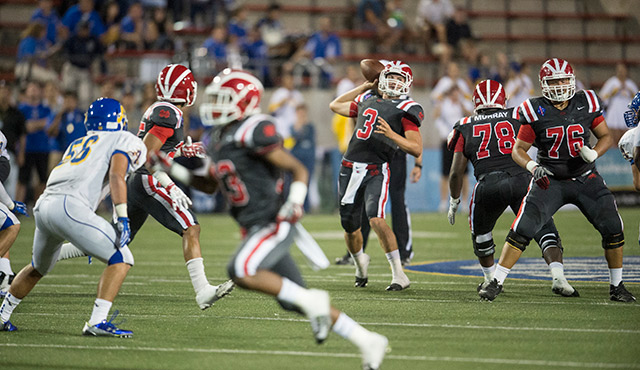When you compete among the nation’s best, anything can happen week to week.
That’s the gist of how three Trinity League head varsity football coaches view the upcoming gridiron league season, which kicks off Oct. 9 under bright Friday night lights.
St. John Bosco, the league champion the past three years with perfect 5-0-0 records, still is viewed as the probable team to beat for top Trinity League honors this season.
But in a league that is so competitive, any team — Bosco, Mater Dei, Santa Margarita, JSerra, Orange Lutheran, Servite — is capable of stepping up to beat a league rival, coaches say.
The Trinity League has produced three of the last five Pac-5 Division champions.
“To try to say which schools will do well is almost impossible to answer,” Mater Dei head football coach Bruce Rollinson says. “The league is so balanced, with great coaches and great players, that any team can beat another one any given week.”
Adds Rollinson, “Bosco is still the favorite, as they will just reload. To me, the rest of us will all hope that somebody upsets Bosco and that we don’t come up short in our [game].”
The Orange County Register’s OC Varsity actually predicts Mater Dei to win the Trinity League championship and contend for the Pac-5 championship, followed by Bosco at No. 2 and, in order, Santa Margarita, Orange Lutheran, JSerra and Servite.
A Trinity League coaching poll yields the following predicted finish: St. John Bosco, Mater Dei, Santa Margarita, Orange Lutheran, JSerra and Servite.
Coach Scott Meyer is new to Servite. He hopes to turn around the recent fortunes of the Friars, who went 10-13 the last two seasons. Meyer left marquee varsity football powerhouse Corona del Mar this year to become head coach at Servite.
During his four seasons at Corona del Mar, Meyer’s squads won a CIF State title in 2013 and won three CIF-SS divisional championships. His career record with the Sea Kings is 50-6.
But Meyer wasn’t about to make bold predictions to Orange County Catholic about Servite’s prospects this fall.
“Every year is a new year, with players moving on and newcomers stepping up,” Meyer says. “We expect all of our players to work hard every day to become better players and better teammates.”
Adds Meyer of the upcoming season: “In my opinion, the Trinity League is the best league in the nation, so I would expect that all teams compete at the highest level.”
JSerra head football coach Jim Hartigan’s varsity team finished second in the Trinity League last year with a record of 4-1 and an overall record of 10-2.
As for the upside of the Lions’ 2015 season, Hartigan cites his team’s youth and “tremendous” amount of potential, adding, “We compete in a very physical league.”
But Hartigan also cites the Lions’ youth as a weakness this season, noting that a lot of starters graduated from JSerra this spring. Key losses include quarterback Nick Robinson, who went to Georgia; defensive lineman D.J. Bailey, now at Harvard; and wide receiver and defensive back Sam Philippi, now at the University of Pennsylvania.
Hartigan’s squad has two returning starters on offense and six on defense.
Hartigan singles out returning third-year starter Conor O’Brien, a senior wide receiver and defensive back, as the most inspirational player on his team.
“He’s passionate and a very hard worker and a good Catholic,” says Hartigan, now in his ninth season as head varsity football coach at JSerra.
As for the most promising newcomers and younger players coming up at JSerra, Hartigan likes senior wide receiver and defensive back Avery Williams; senior running back, linebacker and defensive lineman Corey Selenski; senior wide receiver, running back and defensive back Charlie Mestaz; and junior offensive lineman and defensive lineman Zelan Tupuola.
“Goal-setting and follow-through are critical aspects to the success of our program,” notes Hartigan, whose career record at JSerra is 45-36.
Rollinson, of Mater Dei, also says his team lost a number of players this year to graduation.
“Here at Mater Dei,” Rollinson says, “the expectations are that the younger players will take advantage of the opportunity that has been presented to them. We have a lot of young players.
“The reality is, we could start as many as five or six sophomores, so they better grow up fast or it could be a long year. But we do have some good solid experienced players coming back.”












